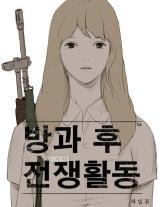There is far too much good to say about Afterschool War Activities (AWT) and little to dislike that makes it hard for me to review it without gushing over how good it is. AWT excels as a psychological character study of young men and women thrown from their normal heyday to the shell shock frontiers of war. It brings to mind the character studies in Apocalypse Now and Full Metal Jacket. So allow me preface this by getting the bad out of the way before gushing over its strengths.
The bad:
AWT's biggest misstep is perhaps AWT's large cast make it hard to figure out who is who in all the frenzy. Given that the central focus of the work is to study the reactions of the living in regards to the events occurring to them, it might be a bit unfair for me to say this but at certain points, I found myself wondering where or what was happening to a character. Yet this is most likely my error given that I devoured the series in a sitting so I might have glossed over character details.
The good:
Where do I start? The series has delectable art that balances masterfully between the comedic and dramatically dark, ushering in colors to wow us and voiding a scene of them to bring attention to nauseating and claustrophobic atmosphere these students feel trapped in. At times it looks goofy, an irreverent nod to the attitude the students have about their conscription and at other times, morose and well-defined to bring us back to the real pain these students face.
The series is a slow burner, taking its time building up the characters and analyzing them. They feel real to us because we identify with some aspects of them. Kimchi's worrying whether or not him and Nara will get closer during the whole war recalls me of my adolescence when I obsessed whether I could get closer to the girl I liked back in high school (and like Kimchi and Nara, it never worked out lol). Their worries are banal like whether they'll be able to take their CSATs next year and at other times indicative of the social divide that existed before their life and death trial (such as Cho and Yeon's talk about their newfound friendship) but it always remains a tad dark. The threat of death literally looms over them and among them. Both attempted and actual suicide and desertion occur at intervals, stretching the tenacity and nerves of our protagonists and military officials. The apocalyptic sci-fi premise does little to distract from the real terrors the students face.
The students are a diverse cast from the individual who considers himself above others to the student who swots from morning to night to the everyday loser who wonders whether he will get closer to the girl he likes to the quiet kid in the back to the weirdo pervert friend to the social butterflies. There's a bit in all of them to recall our own high school classes but the real greatness is not in capturing that but in breaking it apart. This is where AWT excels at. It takes these common characters from our own lives and analyzes them in times of stress. Outcast who no one liked died? Well how do react to this? The quiet kid in the back is actually incredibly dependable and nice? Woah nice never realized it.
AWT doesn't pulls its punches. It hits and hits hard. Students are visibly stressed, they are not prepared for the horrors of war, let alone making decisions on behalf of the rest. It builds up narrative tension in such a way that when the payoff comes you both feel agonized and awed even if you saw it coming. The students pain feels real. Their suffering agonizing. The tension palpable.
AWT is an incredibly well-crafted dark sci-fi drama with an ending that will be sure to grip you and never let you go. Please give it a read.





